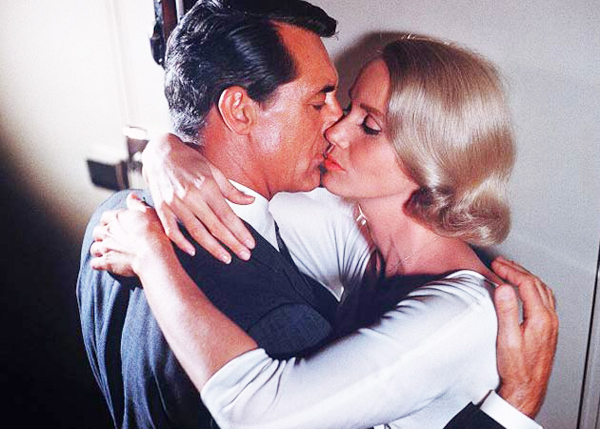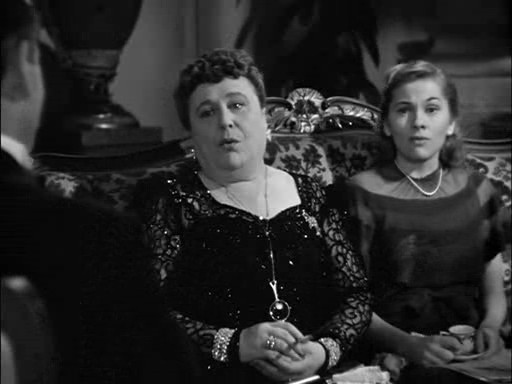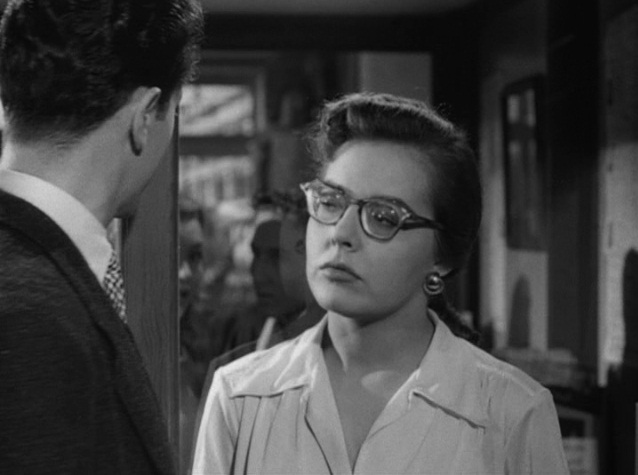Director Alfred Hitchcock is both renowned and
revered in cinematic circles for his daring work in the suspense genre. Despite
the longevity of his career and the many accolades that he achieved, he is
almost as famous for his bizarre personal habits as for the cinematic
trademarks that they inspired. While it is common for artists to incorporate
their personal views and perspectives into their work, recurring motifs and
themes in Hitchcock’s work provide viewers with insight into some of the darker reaches of
the director’s psyche. While I have yet to view all of the films in the
director’s cannon, here are three truly troubling trends I have noticed in the Hitchcock
films that I have viewed.
 |
| I'll love you forever Mr...what was your name again? |
1. IRRATIONAL
ROMANCE: Many a Hitchcock thriller begins with a romance that lasts through
thrills, chills, and unbelievable twists. Unlike many film love stories,
however, Hitchcock’s romances are almost exclusively whirlwind courtships.
These romances begin not with mutual respect or a level of common
understanding, but with shared attraction and insatiable longing that begins and
is cemented with a single exchange of glances. As a result, these romances lack
a logical basis that would sustain a relationship through the shocking ups and
downs that feature in the director’s plots. Because these relationships begin
instantaneously, the audience is left wondering what it is that binds the leads
together throughout a given film’s plot and why we should invest ourselves in a
relationship that the key players don’t seem terribly invested in. While the
inclusion of love stories can serve as an emotional center of a film, in
Hitchcock’s films they all too often serve as mere plot devices and
half-hearted motivation for illogical character decisions. This use of
relationships as a convenient edition to the plot in turn makes the characters
and their motivations seem unbelievable and makes it difficult for viewers to
suspend their disbelief in regards the rest of the story. Thus, Hitchcock's use of
the well-worn cliché of a whirlwind romance reduces his otherwise complex tales of intrigue to simple thrills that amount to little more than parlor tricks once the lights go up and the credits fade. As seen in: Spellbound, North By Northwest, Suspicion, Rebecca, Vertigo, The Birds,
Marnie, Foreign Correspondent, Easy Virtue, and Young and Innocent,
 |
| Joan Fontaine will take Mrs. Danvers over this old biddy any day |
2. OLD
PEOPLE ARE JUST THE WORST: All people have biases, and directors are no different from the rest of us in this respect. What does set Alfred Hitchcock apart, however, is the unusual subject of one of his biases; the elderly. Throughout his film cannon elderly characters (usually women) appear in roles of varying degrees of importance but share one commonality; they are all insufferable people. In his portrayals, he alternates between showing elderly characters who are rigidly cynical or blissfully ignorant of the world around them. The characterizations range between the almost childlike naivety of Bruno's mother in Strangers on a Train and Charlie's mother in Shadow of a Doubt to such moralistic battle axes as Mrs. DeWinter's employer in Rebecca and Mrs. Bates in Psycho. In both instances, the elderly characters' qualities prevent them from functioning in the greater world in a meaningful way, leaving them shrouded within their own delusions. This inability to relate to the world around them makes these characters nuisances to the central players in Hitchcock's films as they blunder the leads into awkward and dangerous situations that they are always unable to comprehend the significance of. Through these portrayals, it becomes evident that the director viewed the elderly as outdated in both moral and social attitudes and obsolete in life's greater plots; a bias that one suspects hit him especially hard when his own career began to wane with age. As seen in:
Rebecca, Strangers on a Train, Psycho, Suspicion, Shadow of a Doubt, Mr. and
Mrs. Smith, Marnie, The Birds, Notorious, Saboteur, and Rope
 |
| Nothing says wanton woman like a pair of glass frames |
3. HITCH
DON’T MAKE PASSES AT GIRLS WHO WEAR GLASSES: Numerous writers have already chronicled the disturbing trends of Hitchcock's heroines and his alleged misogyny, but few writers have detailed his particular disdain for women in glasses. Although the director's heroines are usually too glamorous and mysterious to don such stereotypically unsexy accessories, many of his supporting actresses were required to wear glasses. While these vision impaired ladies do possess variety, they still maintain the common threads of their unconventional behavior. In each portrayal of a woman with glasses, from Strangers on a Train's manipulative nymphomaniac, Miriam, to Vertigo's faithful best friend, Midge, Hitch's bespectacled ladies are all unusually blunt to the point of being tactless, and are unable navigate the niceties of polite society. While this behavior is not always malicious, it is always perceived as being common, condescending, and above all unfeminine. In the few instances in which his leading ladies do wear glasses, such as Suspicion's spinterish Lina and Spellbound's lonely, workaholic, Dr.Petersen, they do so as a symbol of their character's status as outsiders. These women are depicted not as being predictably intellectual or career driven (Lina remains unemployed and acts illogically throughout Suspicion) so much as misguided in their refusal to meet contemporary standards of dress, interests, and social interaction. It is only when these ladies shed their dreaded glasses that they are able to embark upon the film's main adventure and attract the attention of the hero. While the image of the bespectacled spinster who allows life to pass her by is a tired one, it is actually not their passivity that holds Hitchcock's vision impaired ladies back but their assertiveness, as the heroines only step into lead status upon taking a secondary place next to the hero and the confident supporting females remain at their story's margins. Misogynist or not, one thing's for certain, Alfred Hitchcock was not a man to make passes at girls who wear glasses...except for his independent screenwriter/director wife Alma Reville...now there's a thought for another blog entry. As seen in: Strangers On a Train, Vertigo, Stage Fright, Shadow of a Doubt, Spellbound, and Suspicion.

Why is it that the Best Directors are often secretly stark raving lunatics? Hitchock, Kubrick, Chaplin, and (i cant believe I'm saying this next one) Von Trier: All Great Directors whose methods and cinematic trademarks often borderline on abuse...Maybe that's why we're having trouble making it in Hollywood??? I say let's go around torment some young actresses, are you in ??? (lol I kid of course)
ReplyDeleteAs long as no animals are harmed a la The Birds, I think we have a possible gold mine on our hands...the sad thing is behaving that horribly would probably give us more notice than quality work. Oh the humanity
ReplyDelete